The Virtual Reality Berkeley club hosted a conference on Campus bringing students and startups together to showcase their latest VR games and innovations to students on campus. Video by Khaled Sayed
VR_Berkeley from Khaled Sayed on Vimeo.
The Virtual Reality Berkeley club hosted a conference on Campus bringing students and startups together to showcase their latest VR games and innovations to students on campus. Video by Khaled Sayed
VR_Berkeley from Khaled Sayed on Vimeo.
The nine year anniversary for the Plant Exchange. Odette Pollar started it in her backyard and now it is held at 4500 Lincoln Ave, Oakland twice a year. The event is powered by volunteers and it attracts hundreds of visitors.
Plant Exchange from Khaled Sayed on Vimeo.
Ehren Tool from Khaled Sayed on Vimeo.
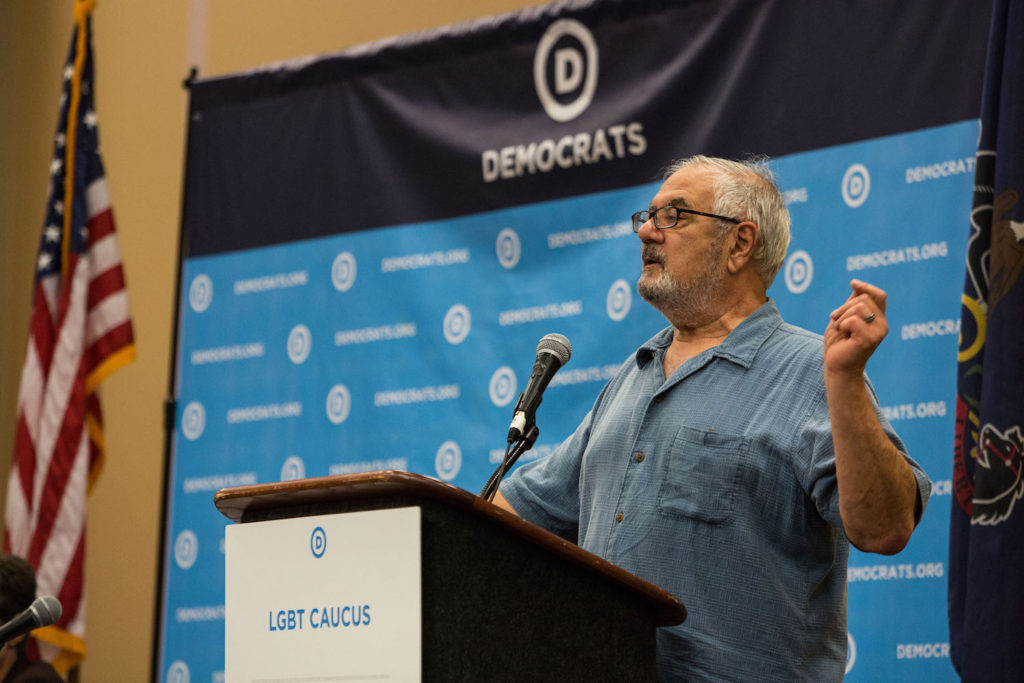
Former Congressman Barney Frank implored LGBTQ delegates at last
week’s Democratic National Convention to get their friends to vote for
nominee Hillary Clinton.
Frank, long known for his blunt talk, minced no words as he addressed
the LGBTQ Caucus July 28 at the Philadelphia Convention Center.
“I’m not going to tell you to vote for Hillary Clinton over Donald Trump
because I’m assuming you already understand that,” he said as the crowd
responded with laughter and cheers for Clinton.
“One of Donald Trump’s promises is to protect us from a foreign
invasion,” Frank said. “As a gay man we have many things we are
concerned about, but the prospect of foreign invasion has never been high
on our list.”
Frank, who long represented Massachusetts in the House of
Representatives and was one of the first members of Congress to come
out as gay, urged people in the room to find their friends who are opposed
to voting for Clinton and try to convince them that voting for somebody
else is a vote for Trump.
“You have a responsibility to confront them in a polite way – I don’t
always do that but that is the goal – and insist that they take into account
our rights,” Frank said.
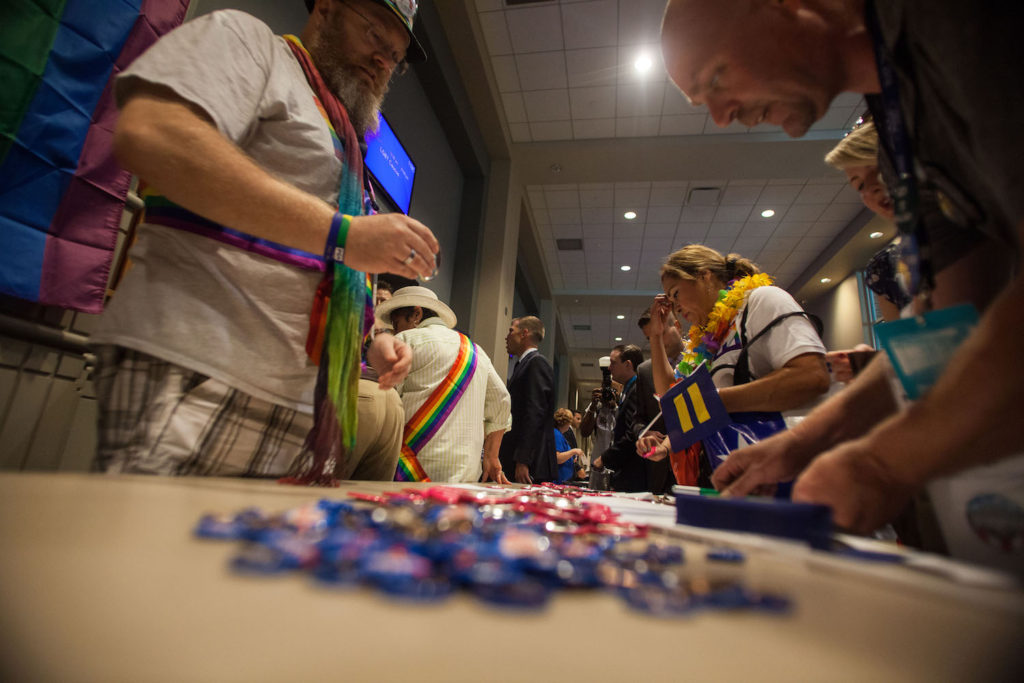
This year’s LGBTQ Caucus was especially large. There were 516
delegates who self-identified as LGBTQ, including a record-breaking 28
transgender delegates; that’s 11.5 percent of all delegates. To put it in
perspective, in 2008 the LGBTQ delegates made up 5.8 percent of all
delegates. In 2012 LGBTQ delegates made up 7.8 percent.
The LGBT Caucus heard from many high-profile politicians such as New
York Governor Andrew Cuomo; Congressman Mike Honda of San Jose;
and Senator Tammy Baldwin (Wisconsin). Former NBA player Jason
Collins and his twin brother, Jarron, also made an appearance.
The meeting started with a moment of silence for the victims of the Pulse
nightclub shooting in Orlando.
Cuomo was greeted with protesters shouting “Free Palestine” after he
took to the podium. Other protesters held signs to stop the Trans-Pacific
Partnership. Anti-TPP protesters were very visible throughout the
convention.
“New York is 18 million people, people from across the globe,” Cuomo said. “We are the welcome mat for the nation. We had a
decision very early on that we have to find commonality, and the ethic of our culture has to be acceptance and non-judgmental.”
“This campaign on the other side talks about building walls, but we talk about building bridges, and how can we find ways to
connect people,” he continued. “That is what New York is all about. There is no secret why so many LGBT people went to New
York early on when they didn’t feel safe or comfortable in their home or their state; because in New York you are accepted. That is
what Stonewall is all about.”
Ted Jackson, a disability rights advocate who worked for the convention in its ADA and community engagement unit, believes that it
is extremely important to participate and attend the LGBTQ Caucus and be active in politics in general.
“Everything from the grassroots level starts with councils and caucuses and grows upward to the elected officials and delegates,”
Jackson said. “The Democratic Party isn’t just what you see on TV. It’s really grassroots of all people coming together from all over
the country who work in different caucuses to the national convention where we nominate every four years. So a lot of work goes
into it. It is important for the LGBTQ people – as a queer person myself – to know that the party recognizes my community by
holding these caucuses.”
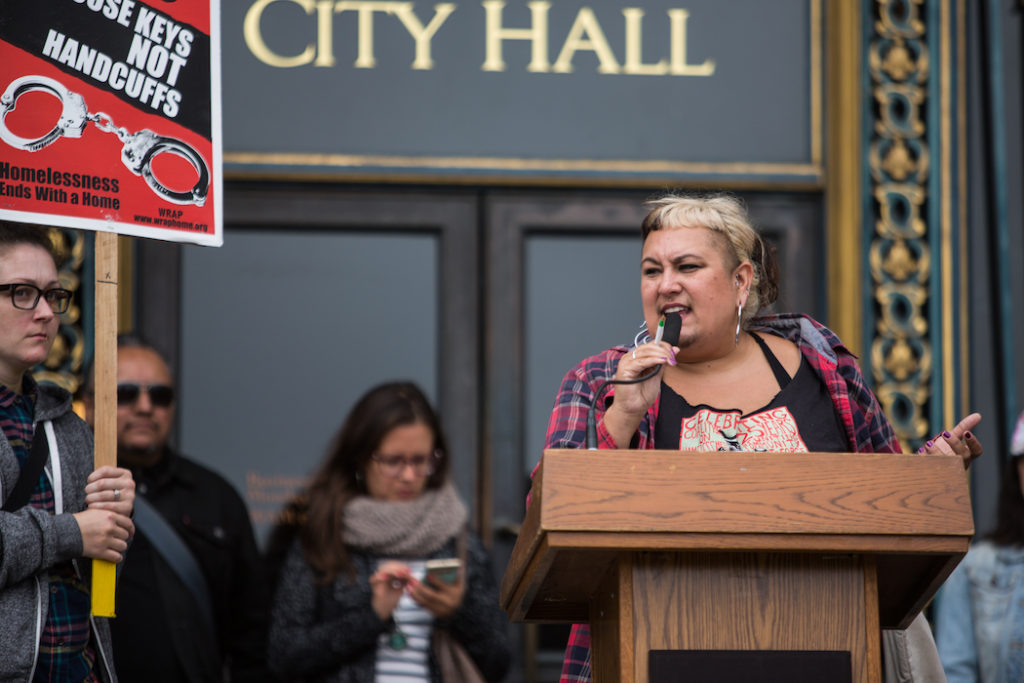
Members of the LGBTQ community rallied on the steps of San Francisco
City Hall this week to ask that Supervisors Scott Wiener and Mark Farrell
withdraw their proposed ballot measures they say will negatively impact
queer and trans homeless people.
Farrell’s ballot measure would allow authorities to remove tent
encampments as long as they give residents 24 hours written notice and
offer shelter beds or other forms of housing. Wiener’s proposal calls for
the San Francisco Police Department to operate a neighborhood crime
unit of at least 60 officers to address increased break-ins, thefts from
vehicles, and homeless encampments.
About 50 people attended. Most of the ire at the July 18 rally was directed
at Farrell’s initiative.
Tommi Avicolli Mecca of the Housing Rights Committee said that the
ballot initiatives would disproportionately affect the LGBTQ community.
For example, offering a queer homeless person a bus ticket home is often
not an option, nor is a one-night shelter bed.
“Everything I heard today from Farrell aides led me to believe what I
believed in the beginning,” Avicolli Mecca said. “This measure is meant
to be a wedge issue to bring out the voters to support more moderate
candidates for supervisors because more moderate candidates in various
districts are going to support these measures and more progressive
candidates won’t support them.”
He and others pointed to the city’s Point-In-Time survey that revealed
nearly 30 percent of the city’s homeless population identifies as LGBTQ.
Recent studies have shown that nationally, about 40 percent of homeless
youth identify as LGBTQ.
“If they want to get housing they would have done it already,” Avicolli
Mecca said. “Farrell has been on the Board of Supervisors for many
years. He’s had every opportunity to do something to get housing for
people. This is not about getting housing. This is not about getting shelter
beds or services. This is about being a wedge issue, because what they are
supposedly addressing in this initiative, tents and encampments, is already
against the law. Why do you need a ballot initiative to address that if it wasn’t a wedge issue?”
Wiener explained that the measure requires an offer of shelter and that offer has to happen under the law.
“This law creates no criminal penalty whatsoever,” said Wiener, a gay man who is in a heated race for a state Senate seat against
progressive Supervisor Jane Kim. “You can’t get a ticket. You can’t get a citation. You can’t get charged with a crime. You won’t get
fined. There are no criminal penalties whatsoever in this measure, and it requires an offer of shelter.”
Wiener also stated that tents are not housing.
“It is not progressive, it’s not humane, it’s not safe or healthy to let people live in tents on sidewalks in neighborhoods,” he said. “It’s
critical to transition people out of the tents into shelter and housing. Every night there are spaces in our shelter system for people to
go. We absolutely need to expand our housing stock as well as navigation center capacity. There is no doubt about it.”
Avicolli Mecca said that Wiener’s crime unit initiative is another way to police homeless people.
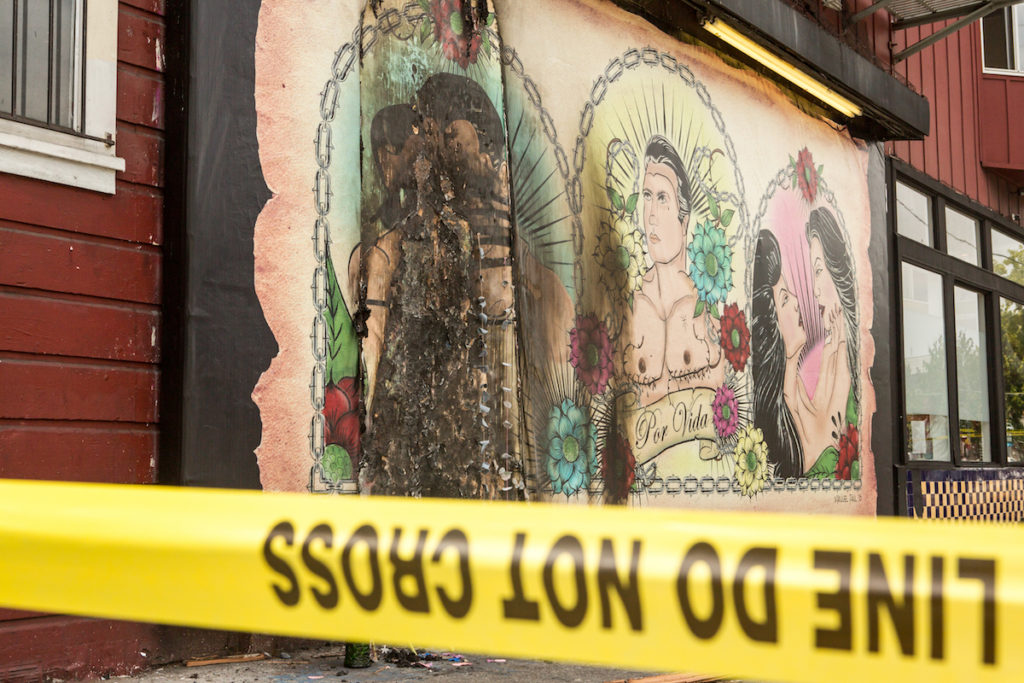
Yellow police tape surrounds a crime scene. This time there is no lifeless body lying on the ground, but a mural, celebrating LGBT pride, displayed on the side of a residential building in the Mission, charred by an arsonist. The voiceless mural speaks volumes about how some in the Mission still feel about LGBT people.
Por Vida (for life) is a mural that depicts two lesbians, a transgender man and two gay men. It’s been under assault in the virtual world of social media, and under physical assault in the real world since it was first displayed on the outside of Galería De La Raza on Bryant Street at 24th Street, the heart of the Mission. It’s been defaced, repaired, and defaced twice more. And in June, vandals struck again, this time with lighter fluid that could have destroyed the building and the six apartments it also houses.
The attack on the mural was especially painful because it closely followed the welcome news that gay marriage was finally sanctioned by law throughout the United States, said Mission resident Lito Sandoval.
“To go from the high of community unity and joy to the punch-in-the-stomach arson act was extremely deflating,” said Lito, a project manager for the Nasdaq stock exchange.
No matter their content, the Mission’s popular, brightly colored murals are sometimes defaced. But attacks on gay-themed public art seem to have a special virulence and have often targeted work exhibited at the Galería, a neighborhood institution dedicated to pushing the boundaries of Latino culture and challenging sexual stereotypes.
“The point of this project is to say that this queer community has been invisible and has been in the periphery of our community, but they have been here, and now we want to honor that, to document that,” said Ani Rivera, the Galería’s executive director.
Por Vida was created by Manuel Paul of the Los Angeles-based Maricón Collective to honor San Francisco Pride Month, and was inspired by the work of queer people of color.
Paul knew that the mural would not be popular with everyone in the Mission, a heavily Catholic, working-class neighborhood, now rapidly gentrifying.
“There was a lot of positive, but the negative was a little bit extreme,” he said. “Some people wanted it to be erased. I never thought of it being torched.”
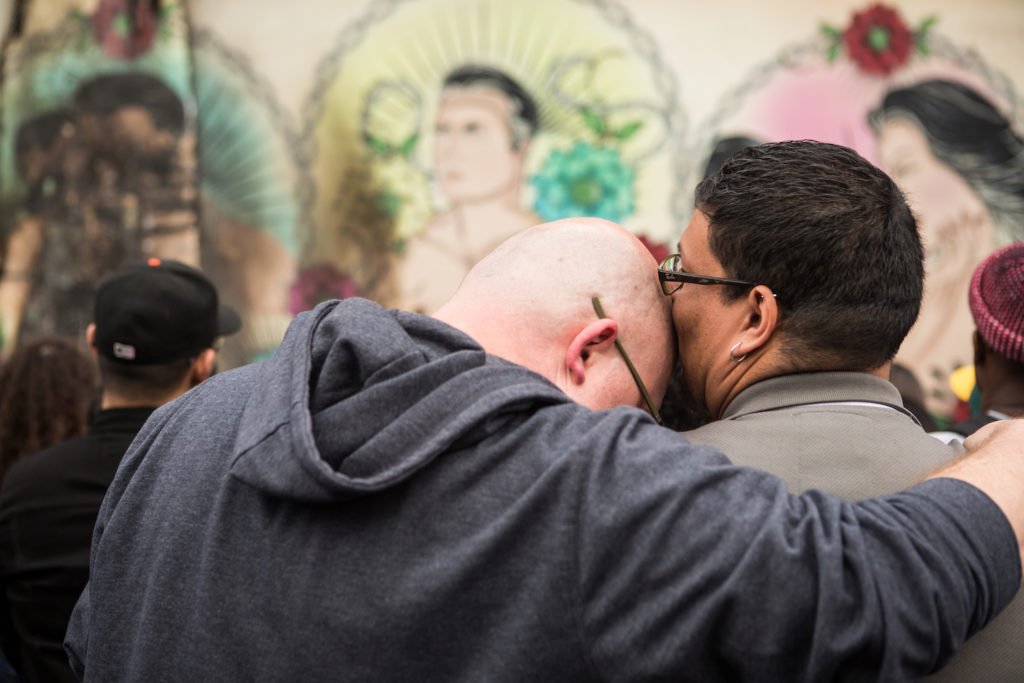
Galería De La Raza is a nonprofit, Latin art gallery that has never shied away from controversy. Founded in the 1970s with a mission to increase public awareness and appreciation of Chicano/Latino art, the Galería invites artists who explore contemporary issues in art, culture and civic society.
The gallery has presented the work of cutting edge and provocative artists since its inception, and the attack on Por Vida was not an isolated incident, says Rivera.
In 1997, the Galería exhibited an installation called “My Cathedral” by Ales Donis, a collection of light boxes showing the intimate joining of cultural icons from opposing political and religious backgrounds. It featured representations of Jesus and Lord Rama; Martin Luther King Jr. and a Ku Klux Klansman; Fidel Castro and John F. Kennedy.
Donis brought these iconic figures together into queer embraces. The light boxes were displayed in the gallery’s front windows. Ten days after it debuted, two of the works had been destroyed, Donis recalls.
The artist didn’t place the light boxes in the window to provoke the neighborhood.
“Having the light boxes in the window was an afterthought,” he said. “I wanted to black out the window so the light boxes would display better.”
Some residents liked the work, but others seemed offended, Donis said. “Some people stopped to appreciate the work, but some others were unhappy to see Mother Teresa and Madonna kissing,” he said. “I even got into shouting matches with some people.”
Other LGBT artists faced similar reactions over the years. In 2000, Galería De La Raza displayed a mural called “Heaven” by Alma López. It was a billboard that showcased two women looking at each other and holding hands in a bedroom setting. It too was vandalized.
Jaime Cortez, an artist and former program manager at the Galería remembers when López’s mural was defaced with spray paint.
“Spray painting is something, but when you set a mural on fire, that is (on) a whole different level,” he said.
Cortez believes that the combination of queer imagery and the traditional, manly Chicano culture of Cholos was what triggered the strong response.
“I wasn’t surprised when the Por Vida was defaced,” he said. “What I was surprised by is that they came back to burn it.”
People upset by the mural took to social media sites like Instagram to voice their anger and disdain for gay culture.
“Mannnn f**k that gay s**t. It ganna keep getting vandalized. You guys wanna call some gay guyz from LA to make this shit in northern califaz. Mannn keep that gay s**t down south.” read the post by valleyqueen.
“This mural ain’t lasting in the mission it don’t belong there take that to Castro and don’t use cholos smh,” jun._.99 posted
An angry Instagram user called fancy @yzs mami said in a post that the mural disrespected local culture and residents, so no one should have been surprised when it was defaced.
“Like seriously? They thought the real mission natives were just going to let it fly – then call them out and say they’re homophobic!? Really?!?!? They have to realize they’re singling ‘cholos’ out to be gay. Why or how can that not be offensive to them?”
While Por Vida was on display outside the Galería, a photo exhibit called “The Q-Sides,” was on display inside. It featured photographs by artists Vero Majano, DJ Brown Amy (Amy Martinez), and Kari Orvik, that challenged long-held assumptions regarding the traditional exclusivity of heterosexuality in lowrider culture.
The show is an homage to the lowrider culture, but with queer models posing next to lowriders, restored cars from the 1940s to the 1960s. The combination of the mural and the Q-Side show touched a nerve in the Mission community.
“We were getting some drama around the opening of our show on Instagram,” Majano said. “Even the night of the show rumors started that someone was coming down to the gallery to f**k things up, because the homies aren’t happy about the show.”
According to Majano, the Q-Side models grew up in and around the lowrider culture and they want to claim it.
“As a woman, as a person of color, I see images around, walking on the street, that offend me all day long,” she said. “It is not my reaction to deface it or burn them.”
Orvik said that the show has been in both Martinez’s and Majano’s minds for a long time. “They have been growing up in a culture and having the desire to be part of a culture that won’t accept them for being gay,” Orvik said. “The idea that there are no queers in lowrider culture is just not true. So it is just a refusal to acknowledge what is there.”
The police have yet to arrest anyone in connection with the arson attack on Por Vida, and Rivera worries that fallout from the incident could push the Galería out of the building that’s housed it for four decades.
“Our existence is threatened, and that is the reality we are dealing with right now. Our building could have caught on fire, and that is a threat that is very real,” she said.
Nonetheless, Rivera is not about to change course or compromise the Galería’s principles.
“The fact that Por Vida received such a violent reaction tells us we are on the right track in terms of the work that needs to be done, and this project needs to continue.”
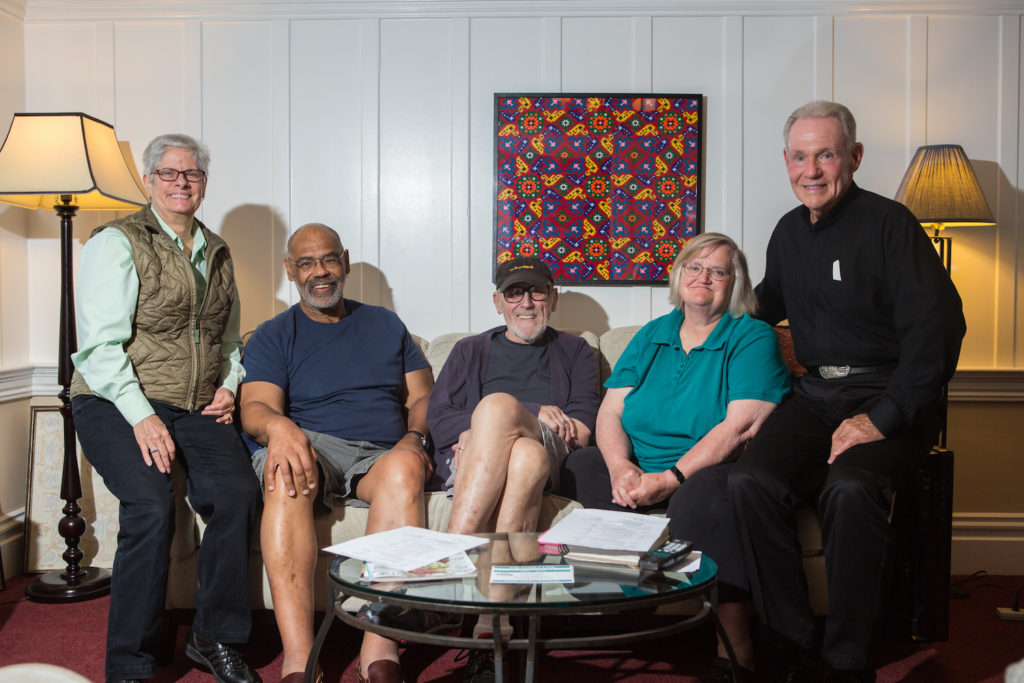
A nonprofit that has provided families of seriously ill loved ones with an
inexpensive place to stay will celebrate its 30th anniversary with a
benefit next week.
The Family Link operates a guesthouse in San Francisco’s Castro
district where visitors with limited financial means can stay when they
visit their loved ones who have life-threatening illnesses or injuries. The
agency was established in 1985 during the early years of the AIDS
epidemic but now includes other illnesses and injuries in its mission.
The benefit is scheduled for Saturday, August 8 at St. Aidan’s Parish
Hall, 101 Gold Mine Drive in San Francisco’s Diamond Heights
neighborhood. Family Link receives no government support or funding
from HIV/AIDS or other nonprofit organizations.
“Our goal is to be a ‘home away from home’ where guests, staff, and
volunteers together create an atmosphere of friendship, love, and care,”
explained Sister Ruth Hall, 66, program director and co-founder of the
Family Link.
Hall remembers 1981 when people started getting sick with a
mysterious disease – before it was identified as AIDS or HIV – and
started dying from it. Many of them were gay men.
In the beginning the Family Link used to house families of sick people
in a tiny apartment at the convent run by sisters at the Episcopal
Community of St. Francis. The guests normally stayed for just a day or
two, before the person died.
“It was that quick, it was like a road accident,” Hall said. “There was no
stigma, there was nothing.”
In 1985 the Family Link received its nonprofit status and went looking
for a larger accommodation for guests. Don Tobin, who was a friend of
Hall’s, was a one-quarter owner of a building on Hayes Street, near
Baker. Tobin allowed the agency to use his share of the building for a
minimum rent so they could host people there, which they did for 10
years.
“Don Tobin told me that his family might need that someday,” Hall said.
“In fact his parents did stay with us before he passed away.”
After Tobin died the agency had to move.
“By the end of that 10 years we were paying half a million dollars in rent,” Hall said. “That sounds like nothing these days but it
was a lot of money back than. We left that place with nothing but used furniture.”
The Family Link bought its current building at 317 Castro Street after the owner of the home died and left the building to AIDS
Emergency Fund.
“The emergency fund knew that we needed a place, so they asked us if we could buy it,” Hall said. “We were able to get a
mortgage and buy this building and we fixed it up. That was in 1994.”
The house has six bedrooms, shared bathrooms, a kitchen area, dining area, an upstairs kitchenette, and garden area.
Unfortunately, the home is not accessible due to it being on a hill and having stairs, according to the agency’s website.
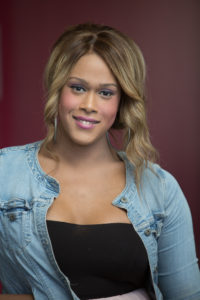
Groundbreaking performances by a transgender opera singer, gay ballroom champions, and a gender-bending boy band are all on tap for this year’s Fresh Meat Festival.
The festival, taking place Thursday, June 18 through Saturday, June 20, features a lineup of some of the nation’s history-making, trailblazing transgender and queer artists, said choreographer Sean Dorsey, a trans man who curates and produces the event, now in its 14th year.
“This year, we’re presenting world-class artists who are trailblazers, pioneers, and on the cutting edge of American performance,” Dorsey
said in a news release.
One of those artists is Breanna Sinclaire, who is the first transgender
woman to receive a master’s degree in the opera program from the San
Francisco Conservatory of Music.
Sinclaire, 25, with a mezzo soprano voice, was a headliner at last year’s
Trans March.
A native of Baltimore and a graduate of the esteemed Baltimore School
for the Arts, Sinclaire earned her bachelor’s of fine arts degree at the
Herb Alpert School of Music at California Institute of the Arts in
Valencia, California, under the tutelage of Maria Fortuna Dean and
former Cirque du Soleil star Kate Conklin. At the San Francisco
Conservatory of Music, she studied under Ruby Pleasure.
Two years ago Sinclaire moved to San Francisco after receiving a
scholarship to the San Francisco Conservatory of Music. Living far
away from her family, she tries to keep in contact.
“I am still in touch with my family, but for them it’s still a process. I
have not spoken to my father in six years. My mother and I are working
on our mother-daughter relationship. I got my SRS two months ago and
she is finally pulling through,” Sinclaire said, referring to sexual
reassignment surgery.
Sinclaire has performed in Mozart’s The Magic Flute , Ravel’s L’enfant
et les sortileges , Rameau’s Platee , Gershwin’s Porgy and Bess , and
Bernstein’s West Side Story . She has also been part of some special
projects in Los Angeles, at the Roy and Edna Disney CalArts Theatre
(Meredith Monk’s Songs of Ascension) and at the Museum of
Contemporary Art (Zachary Sharrin’s Time Bodies ).
She was most recently seen performing as Carmen in “Melons!
Coupons!” from Carmen.
Among many people who inspire her is Jessye Norman, the native
Georgian opera singer who gained fame for her roles in Aida and Les
Troyen and became one of the most popular opera singers in the world.
“Jessye Norman has the most incredible, unique sound,” Sinclair said. “Her musicianship is on point and she is articulate and
educated.”
Follow The Bay Area Reporter
Latest Blogs Two men robbed with guns in Castro incidents – 18 hours ago
Sinclaire said that she’s looking forward to her upcoming performances.
“I am so honored to be one of the chosen performers for Fresh Meat Productions,” she said. “Each
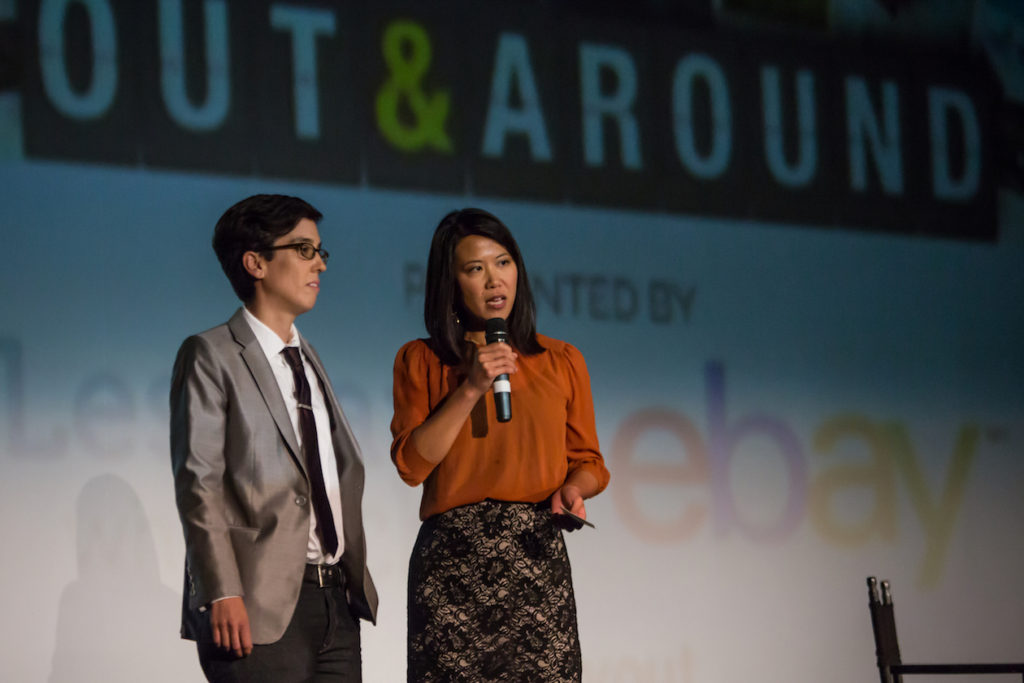
A lesbian couple’s video travel diary in which they interviewed LGBTs
around the world brought people to the Castro Theatre one night this
week, as part of a Lesbians Who Tech and eBay event.
The documentary, Out and Around , stars Jennifer “Jenni” Chang and
Lisa Dazols and follows their journey, interviewing LGBT activists
from countries with very different laws and cultures.
The couple were inspired by the videos from the It Gets Better Project,
which started in 2010 in response to young LGBT people who took
their own lives after being bullied in school. The project features
homemade YouTube videos where people share their own stories of
growing up gay, coming out, and voice encouragement to LGBT youth.
Chang decided to take a year off from her day job at eBay to travel the
world with the love of her life, Dazols. In 2011, they left their normal
lives behind and picked up a video camera, traveling to 15 countries
through Asia, Africa, and South America for one year.
“I think we did a good job filling this theater with our friends,” Chang
said during the Monday, September 14 event at the Castro Theatre.
“This film started out as a very small idea by two people who had no
business making a film, but we wanted to do something meaningful
with our time off. We wanted to take the same spirit of hope from the It
Gets Better project and bring it to the world.”
Dazols, 36, is a licensed clinical social worker working in HIV care at
UCSF. Chang, 33, is a business manager for eBay. The couple met
doing the AIDS Life/Cycle in 2007 and have been together since. They
were married in 2013. Chang said that she is still struggling to get her
parents to accept her as a lesbian and accept her relationship with
Dazols.
Without any film experience, they bought a book on how to make a
documentary, and went in search of the people who are leading the
movement for LGBT equality.
Dazols said that the film has exceeded their expectations in every way.
They are now officially partners with the It Gets Better Project and
Logo TV, which premiered the film last month. It’s scheduled to be
shown at the I Imagine Film Festival in New York this weekend.
“This is home for us, so there are many people in the audience who
were with us for the very first launch party, following our blog, and
backing us on Kickstarter,” Dazols said. “What we learned is that there
are no ideas too small. They can actually happen when you plug into a shared mission by others.”
While interviewing LGBT leaders across the world, Chang and Dazols say they realized that their journey could have larger
impact beyond just self-growth. Their documentary captures the momentous changes occurring in the status of queer people
around the world today.
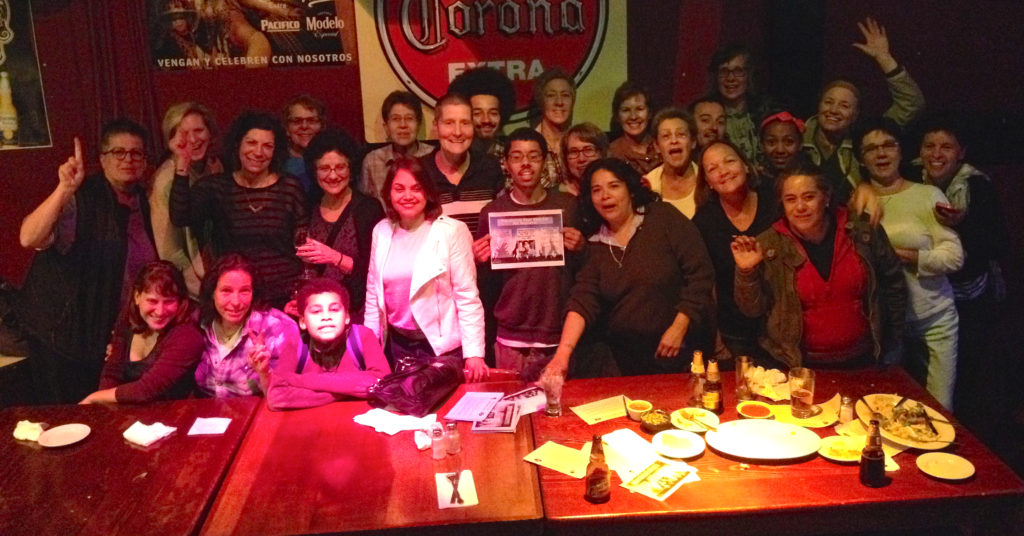
She had made it to the top 10 and had a crowd of supporters at a San
Francisco restaurant cheering her on. But in the end, MK Nobilette, an
out lesbian singer, was eliminated from American Idol last week.
Nobilette, 20, the first openly gay contestant on the show, will go on to
perform in the “American Idol Top 10” tour. She was dropped from the
show after singing Pink’s “Perfect.”
Over 50 people were jammed into the dining room at Cava Restaurant
March 19 to watch the Fox show and cheer on Nobilette, including her
lesbian moms, Mindy Spatt and Laurie Nobilette, who raised their
daughter in San Francisco’s Glen Park neighborhood. She went to Ruth
Asawa San Francisco School of the Arts.
Spatt, communications director at The Utility Reform Network, was not
surprised to see her daughter come out on the show right away as the
season began.
“We are a gay family, she has two moms and grew up in San Francisco,”
Spatt said. “I don’t think she realized what a dramatic thing it was to
say.”
While Nobilette was trying to find herself, she thought about becoming
a firefighter, but music was always on her mind. She sang for kids she
babysat, close friends, and even on street corners in the city.
According to Spatt, an aunt of Nobilette’s who is a big fan of American
Idol convinced her to try out when the show was in San Francisco for
auditions last December.
Nobilette said on a PopStop TV interview that if she didn’t mention her
sexual orientation, it would have been obvious. She was upfront about
who she is and wanted the whole world to know that she is gay.
“It would have been on all over the social media. It isn’t something I
wanted to hide. Reality TV shows can have gay people on them,”
Nobilette said.